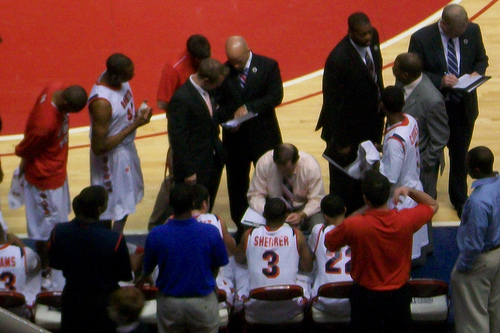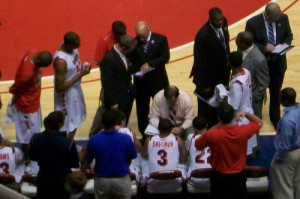Preparing for Tournament Play: Scouting

Scouting is one of the more important aspects to a coach’s preparation for a tournament. For many coaches the act of scouting itself has a number of flow on effects within the team’s preparation and overall scheduling of events during a tournament. Developing a deeper understanding about scouting when heading into a tournament situation can therefore have a significant impact on an outcome as well as the how time is spent.
Below are some points to consider about scouting and successful implementation of the strategy during a tournament situation.

Develop a Standardised Tool
Some coaches find that attending a game with a pen and paper is all they need when scouting a game of basketball. For senior coaches, this might very well be the case. However, for many teams there will be a variety of different people involved in the scouting process. Especially in tournament situations. Having a scouting tool therefore that outlines what is desired by the coach will be of help in directing everyone onto the same points of note or areas needing to be covered.
Develop a Scouting Pool
Because during a tournament games can be scheduled at different times or at different venues it is not always possible for one person (like the Head Coach) to scout every game personally. To overcome this challenge, a number of people should be brought into a scouting pool so all games which need to be covered can be scouted.
People selected can be parents, friends, and other coaches. Obviously, not everyone has the same basketball IQ, so it is therefore more important to develop a standardised scouting tool as discussed earlier so everyone is clear on what is needed.
Even if a team has the ability to video games that can then be reviewed by a coach at a later time, there will still need to be a person available who is able to do this task. Having a pool of people available makes the task of scouting easier for everyone.
Trial during Exhibition Games
If looking to utilise other people’s experience when scouting then a useful strategy for a coach to employ so they acquire the information they desire is to have the scouting pool attended one or two games as a group and scout as a collective. This is really useful for groups where there is a large range of different scouting abilities.
Remember, even senior coaches can become focused on different aspects of a game to those a that the Head Coach might not necessarily see as being of the most significance. Taking some time at the outset of a program to provide guidance can stop a number of issues from occurring later on. These issues, such as miss-information, poor quality of notes, are difficult to manage, correct, and change during a tournament.
Provide Feedback to Scouts
Scouts like any person fulfilling a role within the team need to receive feedback. What was good? What could be improved? Is there enough detail? Are the important parts of the scouting information covered? How did you arrive at this conclusion? Are just some of the questions a coach can ask themselves when about to pass on feedback concerning scouting information.
Different coaches, value different things. For some coaches aspects of team play (offense or defence) are the most vital element of scouting notes. For others individual player habits and attributes are the crucial element in scouting reports. If a coach does not provide some feedback directly related to what areas are of high importance or low importance then a scout is not aware of what areas to focus on more significantly.
Know the Schedule
A scouting tool is developed, a pool of scouts is recruited and everyone has a consistent vision about how to scout. The next step is to look at the schedule for the tournament and calculate which games need to be covered.
Some strategies may include:
- Allocating scouts to a venue; especially useful when multiple venues are in use
- Allocate blocks of time for a scout to be at a venue; this can be a useful way of limiting the burden placed on anyone scout. Develop a roster so a scout may cover the mornings games and another individual covers the afternoons
- Allocate scouts to a team; this is really great for a scout to develop a deeper awareness about an opposition
- Complete a roster for scouts on a round-robin basis; this is useful when utilising parents to help scout so they can see their children play in some games
- Roster scouts for part of a game; this is another useful strategy when using parents, one individual can scout the first half, while another completes the notes on the 2nd half of the game
Schedules for many tournaments come out well in advance. Taking the time to plan will make things significantly easier in these cases. For other situations where the draw is unknown, scouts just need to be more flexible in dealing with the needs of the team in regards to scouting on the run.
Film, Statistics and Scouting Notes
The ideal situation when scouting should come down to a number of sources of information being used to develop a game plan. Not one piece of information will provide all of the answers on how to develop an unbeatable strategy. This can also be said about scouting just one game involving a specific team. The more games scouted of a team, the better the information upon which to make a decision. Using a variety of sources of information will help make the most informed decision possible.
Store Records
A tournament properly scouted can produce a very large sum of information. This can be in the form of any number of different mediums. If possible, storing information electronically is usually the most practical.
Information though should never be thrown away. Even if a game plan was not successful, every game tells a coach something about the opposition. Notes specific to teams, individuals, and opposition coaches should be stored and referred to in other situations to help build a database of scouting knowledge.
Sharing Information
In some cases, sharing information related to scouting can be a very useful strategy to pick up on gaps in knowledge and information. Always be mindful however, about sharing strategy. It is fine to share observations as long as those do not relate directly to a team’s game plan. The best resource to share is film so the other coach has to make up their own mind about the strategy needed.
Scouting is a very important aspect of a team’s preparation before and during a tournament. Taking some time to plan and map out the strategy will help ensure a smooth and fruitful campaign.


Leave a Reply